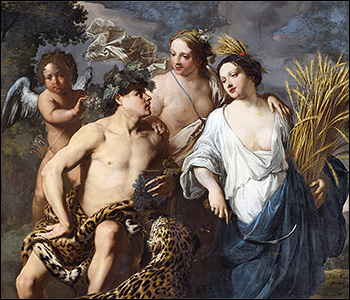|
|
|
|
 John Lyly John Lyly

Jan Miel. Cupid, Bacchus, Venus, and Ceres, 1645.
from
Love's Metamorphosis
by John Lyly
[Ceres questions Cupid about Love]
<The temple-doors open.>

Ceres. Thou great god Cupid, whome the gods regard, and men reuerence, let it bee lawfull for Ceres to offer her sacrifice.

Cupid. Diuine Ceres, Cupid accepteth any thing that cometh from Ceres ; which feedeth my Sparrowes with ripe corne, my Pigeons with wholsome seedes ; and honourest my Temple with chast virgines.

Ceres. Then, Loue, to thee I bring these white and spotlesse Doues, in token that my heart is as free from any thought of loue, as these from any blemish, and as cleare in virginitie, as these perfect in whitenesse. But that my Nymphes may know both thy power and thy lawes, and neither erre in ignorance nor pride, let me aske some questions to instruct them that they offend not thee, whome resist they cannot. In virgines what dost thou chiefest desire?

Cupid. In those that that are not in loue, reuerent thoughts of loue ; in those that be, faithfull vowes.

Ceres. What doest thou most hate in virgines?

Cupid. Pride in the beautifull, bitter taunts in the wittie, incredulitie in all.

Ceres. What may protect my virgines that they may neuer loue?

Cupid. That they be neuer idle.

Ceres. Why didst thou so cruellie torment all Dianas Nymphes with loue?

Cupid. Because they thought it impossible to loue.

Ceres. What is the substance of loue?

Cupid. Constancie and secrecie.

Ceres. What the signes?

Cupid. Sighes and teares.

Ceres. What the causes?

Cupid. Wit and idlenesse.

Ceres. What the meanes?

Cupid. Opportunitie and Importunitie.

Ceres. What the end?

Cupid. Happinesse without end.

Ceres. What requirest thou of men?

Cupid. That onely shall be knowne to men.

Ceres. What reuenge for those that will not loue?

Cupid. To be deceiued when they doe.

Ceres. Well, Cupid, intreate my Nymphes with fauour, and though to loue be no vice, yet spotlesse virginitie is the onely vertue : let me keepe their thoughtes as chast as their bodies, that Ceres may be happie, & they praised.

Cupid. Why, Ceres, doe you thinke that lust followeth loue? Ceres, louers are chast : for what is loue, diuine loue, but the quintescens of chastitie, and affections binding by heauenly motions, that cannot bee vndone by earthly meanes, and must not be comptrolled by any man?

Ceres. Wee will honour thee with continuall sacrifice, warme vs with mild affections ; lest being to hotte, wee seeme immodest like wantons, or too cold, immoueable like stockes.

Cupid. Ceres, let this serue for all ; let not thy Nymphes be light nor obstinate, but as virgines should be, pittifull and faithfull ; so shall your flames warme, but not burne, delight, and neuer discomfort.

Ceres. How say you, my Nymphs, doth not Cupid speake like a god? Counsel you I will not to loue, but coniure you I must that you be not disdainefull.
| | | |
Bond, R. Warwick, M.A. The Complete Works of John Lyly, Vol III.
Oxford: Oxford University Press, 1902, 1967 repr., pp. 308-310.
 | to Works of John Lyly |
Site copyright ©1996-2025 Anniina Jokinen. All Rights Reserved.
Created by Anniina Jokinen on November 11, 1996. Last updated on April 24, 2025.
|
|
The Tudors
King Henry VII
Elizabeth of York
King Henry VIII
Queen Catherine of Aragon
Queen Anne Boleyn
Queen Jane Seymour
Queen Anne of Cleves
Queen Catherine Howard
Queen Katherine Parr
King Edward VI
Lady Jane Grey
Queen Mary I
Queen Elizabeth I
Renaissance English Writers
Bishop John Fisher
William Tyndale
Sir Thomas More
John Heywood
Thomas Sackville
John Bale
Nicholas Udall
John Skelton
Sir Thomas Wyatt
Henry Howard
Hugh Latimer
Thomas Cranmer
Roger Ascham
Sir Thomas Hoby
John Foxe
George Gascoigne
John Lyly
Thomas Nashe
Sir Philip Sidney
Edmund Spenser
Richard Hooker
Robert Southwell
Robert Greene
George Peele
Thomas Kyd
Edward de Vere
Christopher Marlowe
Anthony Munday
Sir Walter Ralegh
Thomas Hariot
Thomas Campion
Mary Sidney Herbert
Sir John Davies
Samuel Daniel
Michael Drayton
Fulke Greville
Emilia Lanyer
William Shakespeare
Persons of Interest
Visit Encyclopedia
Historical Events
Field of the Cloth of Gold, 1520
Pilgrimage of Grace, 1536
The Babington Plot, 1586
The Spanish Armada, 1588
Elizabethan Theatre
See section
English Renaissance Drama
Images of London:
London in the time of Henry VII. MS. Roy. 16 F. ii.
London, 1510, the earliest view in print
Map of England from Saxton's Descriptio Angliae, 1579
Location Map of Elizabethan London
Plan of the Bankside, Southwark, in Shakespeare's time
Detail of Norden's Map of the Bankside, 1593
Bull and Bear Baiting Rings from the Agas Map (1569-1590, pub. 1631)
Sketch of the Swan Theatre, c. 1596
Westminster in the Seventeenth Century, by Hollar
Visscher's Panoramic View of London, 1616. COLOR
|
|